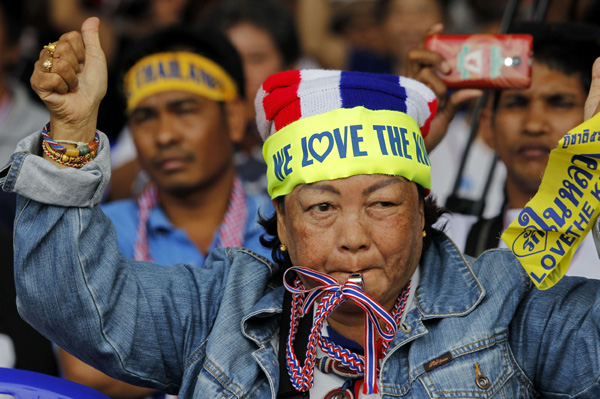 |
|
An anti-government protester wearing a headband gestures during a rally near the Government Complex in Bangkok February 16, 2014. [Photo/Agencies] |
DEEPER CRISIS
The protests are the latest episode in an eight-year conflict that broadly pits Bangkok's middle class and royalist establishment against supporters of Yingluck and her brother, former premier Thaksin Shinawatra. An election on February 2 failed to break the deadlock.
Protesters, aligned with the opposition Democrat Party, blocked voting in a fifth of constituencies, a result that left parliament without a quorum to approve a new government.
The protesters are demanding that Yingluck resign to make way for an appointed "people's council" to overhaul a political system they say has been tainted by her brother, who lives in exile abroad to avoid a jail term for graft.
Thailand's Election Commission will meet with government representatives on Monday to discuss how to complete voting that has been marred by violence and resistance from protesters.
The commission has said it will try to hold elections on April 27 in areas where the February vote was disrupted.
Prompong Nopparit, an adviser to Yingluck's party, said at a news conference that the commission needed to ensure voting can take place by late April to avoid propelling Thailand even deeper into crisis.
"If the Election Commission doesn't listen to all sides...this might be detrimental to Thailand and the election may be voided," said Prompong, echoing sentiments expressed by commission member Somchai Srisutthiyakorn that the whole vote may need to be re-run.
The commission has been locked in a public dispute with the government over who has the authority to call the elections for the rest of the seats and whether the polling date has to be endorsed by the king.
Adding to Yingluck's troubles, judicial cases have been piling up against her party, most prominently an investigation into a rice subsidy scheme for farmers that become one of the biggest threats to her grip on power.
The scheme won her millions of votes in the country's rural heartland and helped sweep Yingluck to power in 2011 but allegations of mismanagement have left her government scrambling to find 130 billion baht ($3.99 billion) to pay some 1 million farmers.
Thailand's National Anti-Corruption Commission said last week it expects to file formal charges against Yingluck for her role in the rice scheme later this month.